The Problem with Modern Games: Comparing Mass Effect to Starflight
The galaxy is in jeopardy. You lead a crew of humans and aliens alike on a mission across star systems to piece together clues, gather the ancient artifacts of a vanished civilization forgotten by history, fight hostile aliens and robots, and discover the horrifying facts behind the coming extinction of all life in the galaxy. This is the general premise of (at least) two video games, last year’s remarkable Mass Effect, which I recently completed a second time, and 1986’s PC masterpiece Starflight, a game I once put at number four in my list of best video games of all time.
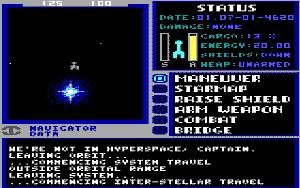 |
STARFLIGHT
Release Date: 8/15/1986
Platform: PC
Developer: Binary Systems
Publisher: Electronic Arts
Sites: IGN
|
 |
STARFLIGHT
Release Date: 8/15/1986
Platform: PC
Developer: Binary Systems
Publisher: Electronic Arts
Sites: IGN
|
It’s not their similarities, however, that are telling about the modern gaming industry; it is their differences. Mass Effect is a cross between a third-person shooter* and a role-playing game where your experience level determines the difficulty of the enemies you face, where you are given a fairly straight-forward and mostly linear main path to follow (with a decent amount of sidequests to distract you), and where the battles and exploration all take place on the surface of a few dozen alien worlds. Starflight, on the other hand, is a cross between a role-playing game and a spaceflight simulator, where the majority of your battles occur in the depths of interstellar space, where your enemies could be vastly inferior or so frighteningly advanced that you wouldn’t stand a chance, where alien diplomacy and resource gathering are more important than learning the backstory of your engineer, where the story is enigmatic and extremely non-linear, and where you have at least 800 distinct and large worlds to explore. A dedicated gamer could beat Mass Effect in twenty hours the first time through, whereas I doubt anybody could finish Starflight the first time in less than a hundred.
*As a side note, the dependance on shooter mechanics in over 90% of all modern games is beyond tiring. Did anybody else notice that all of the big games at E3 this year were shooters?
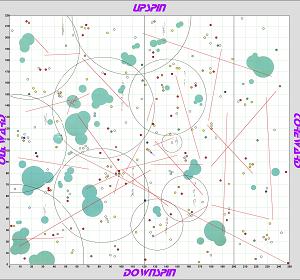 | | The galaxy map in Mass Effect is prettier, but this one is much, much bigger (click to see how much) |
Modern games, like Mass Effect, hold the player’s hand too much. Things like in-game maps that update on their own, journals that keep track of your missions and distill the clues you’ve gathered (keeping you from having to exert any effort at all in figuring out what’s important and what’s not), and enemies that are never too difficult to face make sure that the player never feels overwhelmed or confused, but in so doing, they take away key aspects of the adventure and challenge. Granted, Mass Effect is a fast-paced rollercoaster with stunning graphics and intense firefights—and it is a great game—but when I play it, I can’t help but imagine how much better it would be if it took some cues from a classic like Starflight.
The starmap in Starflight came packaged with the game. In order to get through the experience, you have to keep this map by your side as you play (by the time I was done, this map was torn, faded, stained, photocopied, and written all over). A notepad also helps, so you can write down any clues you find or any hints alien races give you. This forces you to decide on your own what's important and what's not. It's okay for the notepad and map to be in-game, as is the modern standard, but I don't think it's okay that the game does all the plotting and noting, removing any intellectual effort on the part of the gamer and giving you an easy list of options for what your next step should be. Figuring things out on your own is empowering, and until you've played a game that trusts you to do that, you'll never understand why it's such a superior experience.
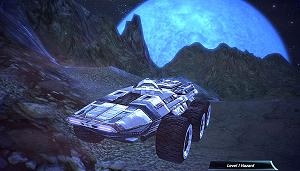 | | The MAKO is awesome, but its unlimited fuel supply makes planetary exploration too simple |
Like Starflight, Mass Effect includes a vehicle that is used to explore the surface of alien planets. However, using this surface vehicle, called the MAKO, to gather minerals and collect alien artifacts is trivial, only rewarding you with a smattering of experience points and galactic currency, and you can explore the entire world in a manner of minutes, without fear of running out of fuel or getting lost.
Using Starflight’s terrain vehicle to mine planetary resources and discover ancient artifacts, however, is not only more challenging (due to larger maps and fuel concerns) but absolutely essential; it is your primary means of making money (called MUs) and the only way to uncover certain clues that will help you put the story together. You see, in Starflight, when you start the game, you are starting from scratch, with a piss-poor ship, an untrained crew, and barely enough fuel to take your ship to even the closest star system. Other than a few basic objectives listed in the game manual (gather resources, find worlds fit for human colonization), you have no idea what mysteries lie ahead of you, and a single misstep could have you facing hostile enemies that will kill you as quickly as they will look at you, landing on worlds with crushing gravity, or getting lost by accidentally traveling through an uncharted wormhole.
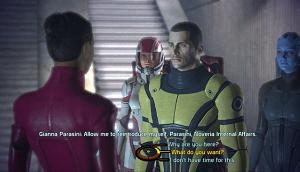 | | Individuals have more weight and importance in Mass Effect's universe |
I’m not trying to say that video games today are too easy; I’m saying they’re too simplistic. When you beat a game like Mass Effect, you can feel like you’ve accomplished something and played a really cool game, but when you beat a game like Starflight, you feel like you’ve conquered the known galaxy and figured out something few people have.
This is not to say that Mass Effect is devoid of strengths. While both games have intricately drawn details, from the historical timeline of an alien race to the origins of spaceflight, Mass Effect clearly has the deeper and more epic universe. Individuals have far more character and interaction in Mass Effect, and while both games deal with dialogue trees and the consequences of your attitude, Mass Effect integrates the consequences into more permanent results and offers storyline branching that wasn't done in Starflight. Additionally, there's more variety and personality in Mass Effect's side quests, as Starflight is often mired by repetitive conversations with aliens, long stretches of boring exploration, and the need to grind.
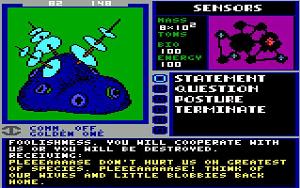 | | The different alien races in Starflight have all the personality and backstory, though individual characters are nonexistent |
Still, Starflight's biggest strength is in the unexpected. While the characters are all pretty one-dimensional, the aliens you come across--most notably the Borg-esque Uhlek (the Uhlek came first, it should be noted)--are full of surprises. And though you spend an inordinant amount of time trekking through the stars, the sudden contact with a ship, flux, nebula, or strange anomaly is exciting in its mystery.
Unfortunately, in this age of Internet FAQ pages, comprehensive strategy guides, and even TV shows that get you through the rough patches, a game like Starflight would lose its luster. You’d probably know what the game is really about before you even played it, making the exploration early in the game feel much more tedious than it would if you had no idea what’s out there. Nowadays, games like Mass Effect, which introduces you to the basic premise as soon as you finish the tutorial level, are more suited to the industry, and that’s unfortunate. It’s much harder in today’s market to create a sense of wonder or a fear of the unknown, two things that really drive old-school games like Starflight.
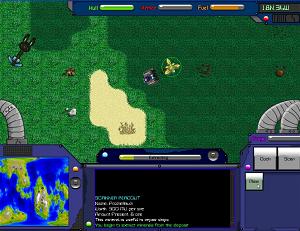 | | Starflight: The Lost Colony screenshot |
This wouldn’t be a problem, of course, if everybody could go out there and play Starflight today. Unfortunately, the game looks ridiculously dated and you have to make modifications to your computer just to play it (it is so incredibly archaic that modern computers don’t know what to do with it). Additionally, you have to find and download it online, since it has been out of the retail circulation for over a decade now. Most modern gamers would never go out of their way to play something as old as Starflight, because there’s too much legwork involved and the graphics are beyond terrible by today’s standards. Mass Effect is much more appealing, despite its inferiority in this writer’s eyes.
While a new, freeware entry in the Starflight series, called Starflight: The Lost Colony is slated for release soon, only hardcore fans of the original (like myself) know about it, and even fewer will actually download and play it. Still, before Mass Effect, I felt no hope at all that we might one day see a mainstream video game similar to Starflight: an enormous, open-ended spacefaring experience, but with the graphics and capabilities of a modern gaming machine. Mass Effect may not be as good as Starflight, but it still has enough in common—and is still a kick-ass game with enough mainstream success—to give me pause (and you better believe I'll be one of the first in line when its sequel comes out). Maybe some nostalgic game developer out there has had the same thought I’ve had, and maybe that developer is already hard at work, creating something that marries the best of the old with the best of the new to create the ultimate spacefaring game experience.
-e. magill, 07/28/2008
|
|